Now, I grew up with dad brewing elderberry wine by the job lot. And I helped him with it more than once: stuff was always good. But that seemed like more work than I really wanted to do myself, and I thought mead was a little less common (although honestly, I have yet to find anyone else that does a decent elderberry). So I did some research, found some recipes ("3 lbs honey to the gallon" is all the "recipe" I really use), and started experimenting. Turns out, I make a pretty good brew.
Mead brewed with fruit in it is called a melomel. I've done strawberry, plum, and currently have a batch of blueberry going that already tastes delicious. Then a friend asked of I could make an apple/cherry cider.
I don't do cider: I do mead. But hey, that DOES sound good!
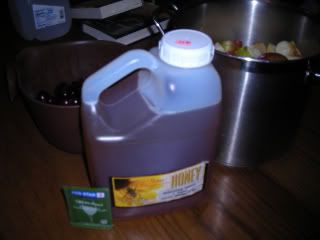
Here's the starting ingredients. Honey (now going with 4 lbs per gallon), yeast (I use Cote des Blanc), and fruit. Not pictured is the 3 gallons of spring water that will be added to all this...
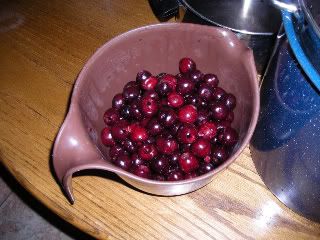
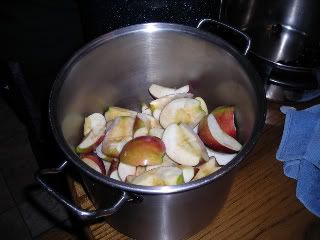
That's the cherries and apples. 3 lbs of cherries, 6 lbs of macintosh apples. Damn close to a gallon of fruit alone.
Some folks will use straight fruit juice, and call it a melomel. To me, that's cheating: I add several lbs of fruit to the must, and deal with the hassle. To me, the finished product is worth it.
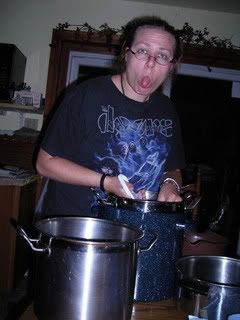
Spoon pitting the cherries. As she said: "I just popped 160 cherries for you!".
Gotta love my shy, retiring wife.
So... pit cherries. Core and quarter the apples. Run all the fruit through the blender, and pour into the primary fermenter. There goes an hour or so.
Then you have to liquify the honey. We do it by heating spring water in a large kettle, and pour the honey into that. Stir until all the honey is disolved (keep some extra hot water handy to rinse the honey container). Once it's all disolved, add to the must. Drop a thermometer in: the yeast should be added at a little under 105*, which is also when you should take your preliminary hydrometer reading (if you want to know the alchohol content of the finished product)...
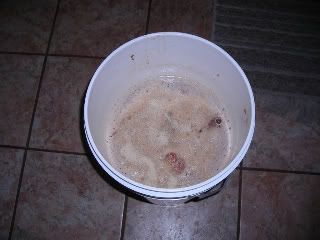
Here's the must, all ready to be sealed up. In a couple weeks, we'll strain the pulp out, and transfer everything over to a carboy.
Note: when using fruit pulp, do NOT just pour the must into the carboy. Doing so will result in said pulp rising to the top, trapping the gas. Eventually, the pulp will be pushed up into the vapor lock and blow it. Makes your brewing room smell nice, but is a mess to clean up. Ask me how I know... ;)
This batch should be ready by December, possibly January. I'll post updates on how it goes...
No comments:
Post a Comment